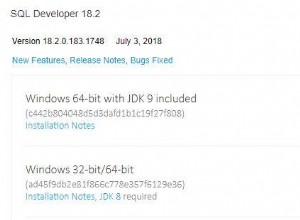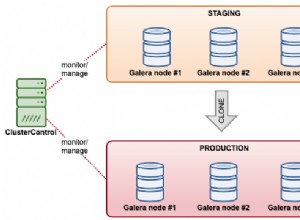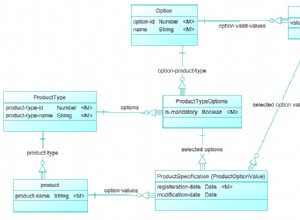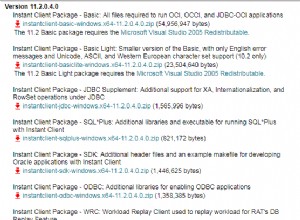Bene, allora ho scritto una migrazione per ottenere questo risultato per il mio sistema.
-
Ti consente di specificare facoltativamente un nome di connessione per fare riferimento a una connessione diversa da quella predefinita.
-
Ottiene l'elenco delle tabelle dal database della connessione utilizzando un
SHOW TABLESinterrogazione. -
Quindi scorre ogni tabella e aggiorna tutte le colonne di tipo stringa/carattere con il nuovo set di caratteri e regole di confronto.
-
Ho fatto in modo che sia necessario fornire un callback per determinare se una colonna dovrebbe avere o meno la lunghezza modificata nella nuova lunghezza fornita. Nella mia implementazione,
VARCHAReCHARle colonne con lunghezza maggiore di 191 vengono aggiornate per avere lunghezza 191 durante la migrazione verso l'alto eVARCHAReCHARle colonne con lunghezza esattamente 191 vengono aggiornate per avere lunghezza 255 sulla migrazione inversa/verso il basso. -
Una volta aggiornate tutte le colonne stringa/carattere, verranno eseguite un paio di query per modificare il set di caratteri e le regole di confronto della tabella, convertendo le regole di confronto rimanenti in quella nuova e quindi per modificare il set di caratteri e le regole di confronto predefiniti della tabella.
-
Infine, verranno modificati il set di caratteri e le regole di confronto predefiniti del database.
Note
-
Inizialmente, ho provato a convertire semplicemente le tabelle nella nuova codifica, ma ho riscontrato problemi con la lunghezza delle colonne. 191 caratteri è la lunghezza massima dei caratteri in
utf8mb4quando si utilizza InnoDB nella mia versione di MySQL/MariaDB e si modificano le regole di confronto delle tabelle si è verificato un errore. -
All'inizio volevo solo aggiornare le lunghezze alla nuova lunghezza, ma volevo anche fornire una funzione di rollback, quindi questa non era un'opzione perché nel metodo inverso avrei impostato le lunghezze delle colonne che erano
utf8mb4a 255, che sarebbe stato troppo lungo, quindi ho optato per modificare anche le regole di confronto. -
Ho quindi provato a modificare semplicemente la lunghezza, il set di caratteri e le regole di confronto di
varcharecharcolonne troppo lunghe, ma nel mio sistema ciò provocava errori quando avevo indici a più colonne che includevano tali colonne. Apparentemente, gli indici a più colonne devono utilizzare le stesse regole di confronto. -
Una nota importante su questo è che la migrazione inversa/verso il basso non sarà perfetta al 100% per tutti. Non credo che sarebbe possibile farlo senza memorizzare informazioni aggiuntive sulle colonne originali durante la migrazione. Quindi la mia attuale implementazione per la migrazione inversa/verso il basso prevede che le colonne con lunghezza 191 fossero originariamente 255.
-
Una nota altrettanto importante su questo è che questo cambierà alla cieca le regole di confronto di tutte le colonne di stringhe/caratteri con le nuove regole di confronto, indipendentemente dalle regole di confronto originali, quindi se ci sono colonne con regole di confronto diverse, verranno tutte convertite in quella nuova e il contrario lo farà lo stesso, gli originali non verranno conservati.
<?php
use Illuminate\Database\Migrations\Migration;
class UpgradeDatabaseToUtf8mb4 extends Migration
{
/**
* Run the migrations.
*
* @return void
*/
public function up()
{
$this->changeDatabaseCharacterSetAndCollation('utf8mb4', 'utf8mb4_unicode_ci', 191, function ($column) {
return $this->isStringTypeWithLength($column) && $column['type_brackets'] > 191;
});
}
/**
* Reverse the migrations.
*
* @return void
*/
public function down()
{
$this->changeDatabaseCharacterSetAndCollation('utf8', 'utf8_unicode_ci', 255, function ($column) {
return $this->isStringTypeWithLength($column) && $column['type_brackets'] == 191;
});
}
/**
* Change the database referred to by the connection (null is the default connection) to the provided character set
* (e.g. utf8mb4) and collation (e.g. utf8mb4_unicode_ci). It may be necessary to change the length of some fixed
* length columns such as char and varchar to work with the new encoding. In which case the new length of such
* columns and a callback to determine whether or not that particular column should be altered may be provided. If a
* connection other than the default connection is to be changed, the string referring to the connection may be
* provided as the last parameter (This string will be passed to DB::connection(...) to retrieve an instance of that
* connection).
*
* @param string $charset
* @param string $collation
* @param null|int $newColumnLength
* @param Closure|null $columnLengthCallback
* @param string|null $connection
*/
protected function changeDatabaseCharacterSetAndCollation($charset, $collation, $newColumnLength = null, $columnLengthCallback = null, $connection = null)
{
$tables = $this->getTables($connection);
foreach ($tables as $table) {
$this->updateColumnsInTable($table, $charset, $collation, $newColumnLength, $columnLengthCallback, $connection);
$this->convertTableCharacterSetAndCollation($table, $charset, $collation, $connection);
}
$this->alterDatabaseCharacterSetAndCollation($charset, $collation, $connection);
}
/**
* Get an instance of the database connection provided with an optional string referring to the connection. This
* should be null if referring to the default connection.
*
* @param string|null $connection
*
* @return \Illuminate\Database\Connection
*/
protected function getDatabaseConnection($connection = null)
{
return DB::connection($connection);
}
/**
* Get a list of tables on the provided connection.
*
* @param null $connection
*
* @return array
*/
protected function getTables($connection = null)
{
$tables = [];
$results = $this->getDatabaseConnection($connection)->select('SHOW TABLES');
foreach ($results as $result) {
foreach ($result as $key => $value) {
$tables[] = $value;
break;
}
}
return $tables;
}
/**
* Given a stdClass representing the column, extract the required information in a more accessible format. The array
* returned will contain the field name, the type of field (Without the length), the length where applicable (or
* null), true/false indicating the column allowing null values and the default value.
*
* @param stdClass $column
*
* @return array
*/
protected function extractInformationFromColumn($column)
{
$type = $column->Type;
$typeBrackets = null;
$typeEnd = null;
if (preg_match('/^([a-z]+)(?:\\(([^\\)]+?)\\))?(.*)/i', $type, $matches)) {
$type = strtolower(trim($matches[1]));
if (isset($matches[2])) {
$typeBrackets = trim($matches[2]);
}
if (isset($matches[3])) {
$typeEnd = trim($matches[3]);
}
}
return [
'field' => $column->Field,
'type' => $type,
'type_brackets' => $typeBrackets,
'type_end' => $typeEnd,
'null' => strtolower($column->Null) == 'yes',
'default' => $column->Default,
'charset' => is_string($column->Collation) && ($pos = strpos($column->Collation, '_')) !== false ? substr($column->Collation, 0, $pos) : null,
'collation' => $column->Collation
];
}
/**
* Tell if the provided column is a string/character type and needs to have it's charset/collation changed.
*
* @param string $column
*
* @return bool
*/
protected function isStringType($column)
{
return in_array(strtolower($column['type']), ['char', 'varchar', 'tinytext', 'text', 'mediumtext', 'longtext', 'enum', 'set']);
}
/**
* Tell if the provided column is a string/character type with a length.
*
* @param string $column
*
* @return bool
*/
protected function isStringTypeWithLength($column)
{
return in_array(strtolower($column['type']), ['char', 'varchar']);
}
/**
* Update all of the string/character columns in the database to be the new collation. Additionally, modify the
* lengths of those columns that have them to be the newLength provided, when the shouldUpdateLength callback passed
* returns true.
*
* @param string $table
* @param string $charset
* @param string $collation
* @param int|null $newLength
* @param Closure|null $shouldUpdateLength
* @param string|null $connection
*/
protected function updateColumnsInTable($table, $charset, $collation, $newLength = null, Closure $shouldUpdateLength = null, $connection = null)
{
$columnsToChange = [];
foreach ($this->getColumnsFromTable($table, $connection) as $column) {
$column = $this->extractInformationFromColumn($column);
if ($this->isStringType($column)) {
$sql = "CHANGE `%field%` `%field%` %type%%brackets% CHARACTER SET %charset% COLLATE %collation% %null% %default%";
$search = ['%field%', '%type%', '%brackets%', '%charset%', '%collation%', '%null%', '%default%'];
$replace = [
$column['field'],
$column['type'],
$column['type_brackets'] ? '(' . $column['type_brackets'] . ')' : '',
$charset,
$collation,
$column['null'] ? 'NULL' : 'NOT NULL',
is_null($column['default']) ? ($column['null'] ? 'DEFAULT NULL' : '') : 'DEFAULT \'' . $column['default'] . '\''
];
if ($this->isStringTypeWithLength($column) && $shouldUpdateLength($column) && is_int($newLength) && $newLength > 0) {
$replace[2] = '(' . $newLength . ')';
}
$columnsToChange[] = trim(str_replace($search, $replace, $sql));
}
}
if (count($columnsToChange) > 0) {
$query = "ALTER TABLE `{$table}` " . implode(', ', $columnsToChange);
$this->getDatabaseConnection($connection)->update($query);
}
}
/**
* Get a list of all the columns for the provided table. Returns an array of stdClass objects.
*
* @param string $table
* @param string|null $connection
*
* @return array
*/
protected function getColumnsFromTable($table, $connection = null)
{
return $this->getDatabaseConnection($connection)->select('SHOW FULL COLUMNS FROM ' . $table);
}
/**
* Convert a table's character set and collation.
*
* @param string $table
* @param string $charset
* @param string $collation
* @param string|null $connection
*/
protected function convertTableCharacterSetAndCollation($table, $charset, $collation, $connection = null)
{
$query = "ALTER TABLE {$table} CONVERT TO CHARACTER SET {$charset} COLLATE {$collation}";
$this->getDatabaseConnection($connection)->update($query);
$query = "ALTER TABLE {$table} DEFAULT CHARACTER SET {$charset} COLLATE {$collation}";
$this->getDatabaseConnection($connection)->update($query);
}
/**
* Change the entire database's (The database represented by the connection) character set and collation.
*
* # Note: This must be done with the unprepared method, as PDO complains that the ALTER DATABASE command is not yet
* supported as a prepared statement.
*
* @param string $charset
* @param string $collation
* @param string|null $connection
*/
protected function alterDatabaseCharacterSetAndCollation($charset, $collation, $connection = null)
{
$database = $this->getDatabaseConnection($connection)->getDatabaseName();
$query = "ALTER DATABASE {$database} CHARACTER SET {$charset} COLLATE {$collation}";
$this->getDatabaseConnection($connection)->unprepared($query);
}
}
Per favore, per favore, per favore, esegui il backup del tuo database prima di eseguire questo . Usalo a tuo rischio!




